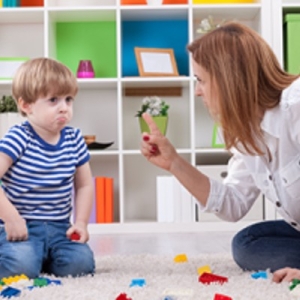From The Library
Sticks and Stones: What We Say and How We Say it Matters

Most of us have heard some version of the nursery rhyme, “Sticks and stones may break my bones, but names will never hurt me.” And when we’ve heard it, some of us may have thought to ourselves, “That’s not true.” From a very young age, we most likely had the awareness that, “Yes, sticks and stones may break our bones, but names do hurt us.” They can hurt a lot! Those unkind remarks whether intentionally malicious or careless and thoughtless do hurt our feelings and may scar our psyche and our heart very deeply for decades to come. And although the school yard taunting or teasing from foes is painful, it’s the unkind words from those closest to us that may hurt the most and may cause the most lasting damage.
When a parent, caregiver, close family member, teacher, close friend or authority figure uses critical or careless words or a harsh tone when describing an aspect of a child’s character or behavior, a child may put much more weight on the words and message because it comes from someone they love, admire, respect or fear. When speaking to a child using intentionally critical words given in a reprimand or unintentionally careless words said in jest, adults ought to be mindful of the imbalance in the relationship. Intentionally critical words from those whom we depend upon most for love and support are damaging and disempowering. So too can careless remarks have long reaching wounding emotional effects.
Physical injury is visible and more easily treated. When a toddler falls, someone is more likely to pick up that child and kiss their boo boo to make it better. But when an unkind word is spoken, no one may even notice that the child’s feelings were hurt or even worse they may laugh and dismiss the child’s reaction thinking the child won’t remember the incident or that the child will get over it.
A child may not have the wherewithal to respond appropriately. Children, especially young children are generally defenseless in such instances. A young child may not have the language skills or confidence to reply to a reprimand, unkind critical remark or careless statement. A seemingly innocent or innocuous comment may be received by a child as a slight. They are not able to correct an adult by replying, “What you said was mean!” or “What you said hurt my feelings.” And they may feel even more powerless, hurt, confused and dismissed when the offending adult laughs saying, “I was only teasing you.” What exactly is teasing anyway? Do you make a careless comment to your child and then disregard their hurt feelings? An adult may not realize the power their words have over their child or children.
It’s an inequitable exchange when a grown up speaks critically and unkindly to a child. We’re not talking about correcting bad behavior here. We’re talking about remarks that a child may receive as a judgment or a threat. “I should have left you at the park.” “You’re not smart like your sister.” “We were hoping for a boy.” “You never listen.” “You’re always breaking things; maybe we can’t afford to keep you.” “You always play the clown.” “You’re a couch potato, nothing like your (athletic) brother.” “You’re messy just like your mother.” Very young children think concretely; they believe that what you tell them is a global fact. They can’t make fine distinctions, engage in abstract thinking or understand that things are relative and situational. They may not consider that what was said was incorrect or untrue.
So, when you say, “I should have left you at the park,” they are terrified that you will abandon them and that they will be lost, alone, and separated from you. A child looks to their parent as their primary source of support and nurturing. Should you lash out in a moment of fatigue, anger or rage, it’s important that you apologize to your child and explain that you were tired or upset. You need to reassure your child with soothing and encouraging words. What we say and how we say it has a great deal of significance. When a child knows that they are cared for, respected, supported, and loved by deeds and words they will be more confident and secure in all their social interactions. A strong emotional foundation is among one of the most treasured gifts a parent can give their children.



